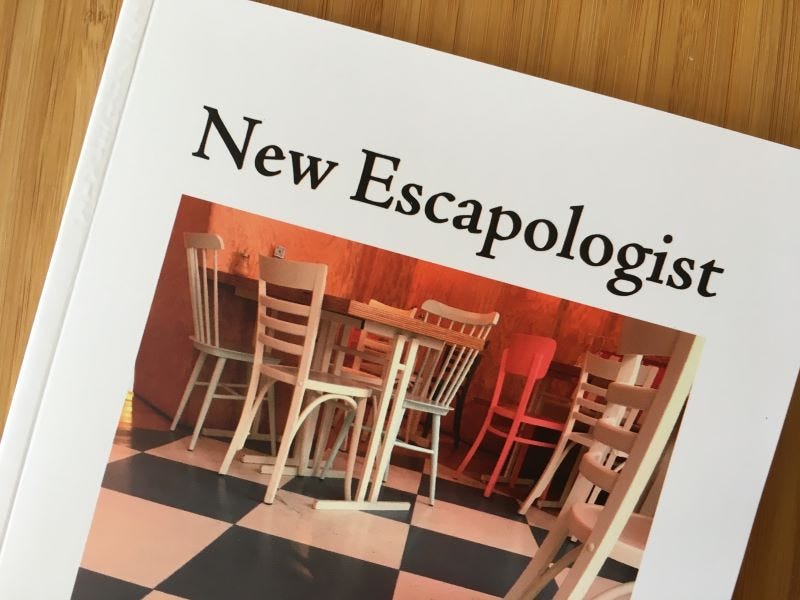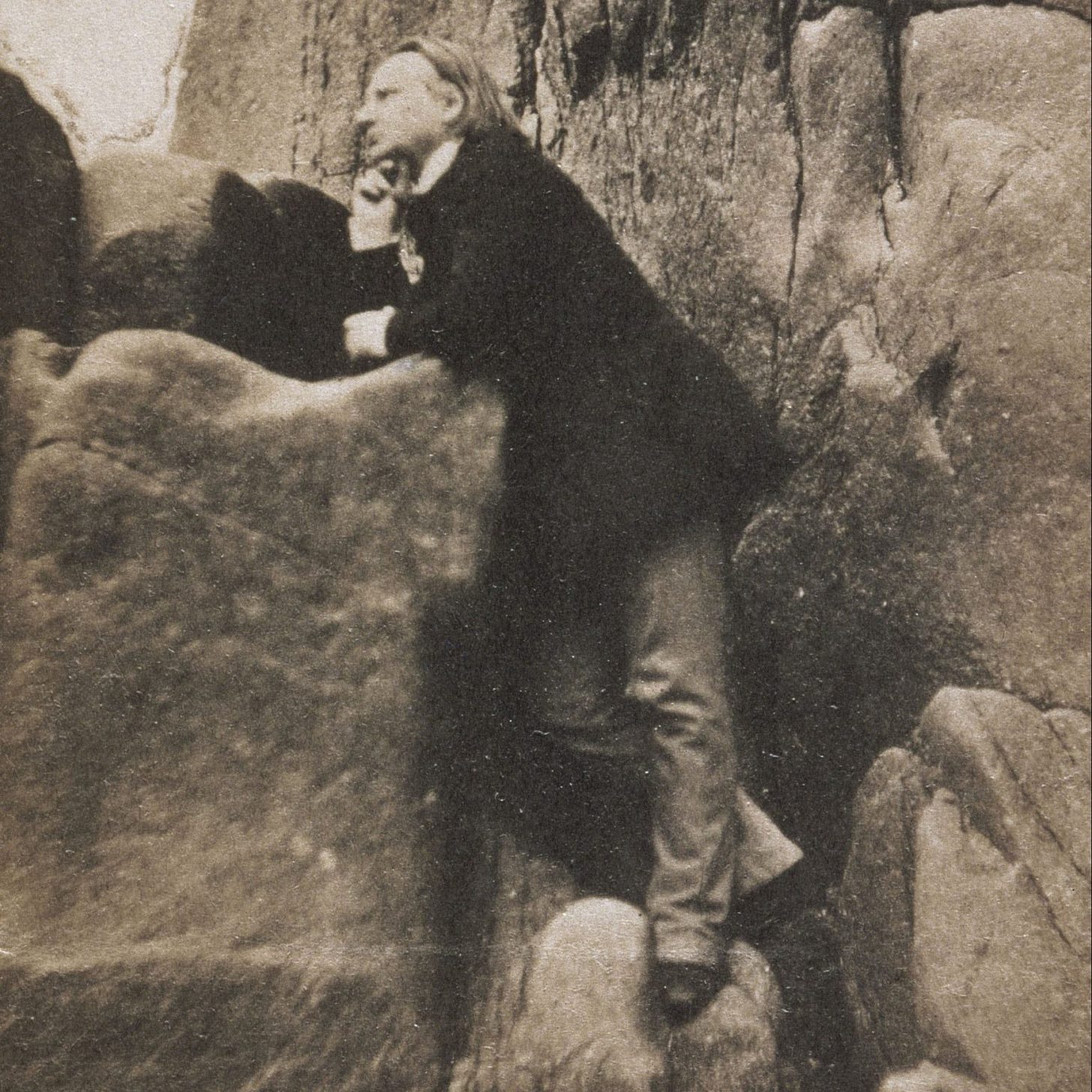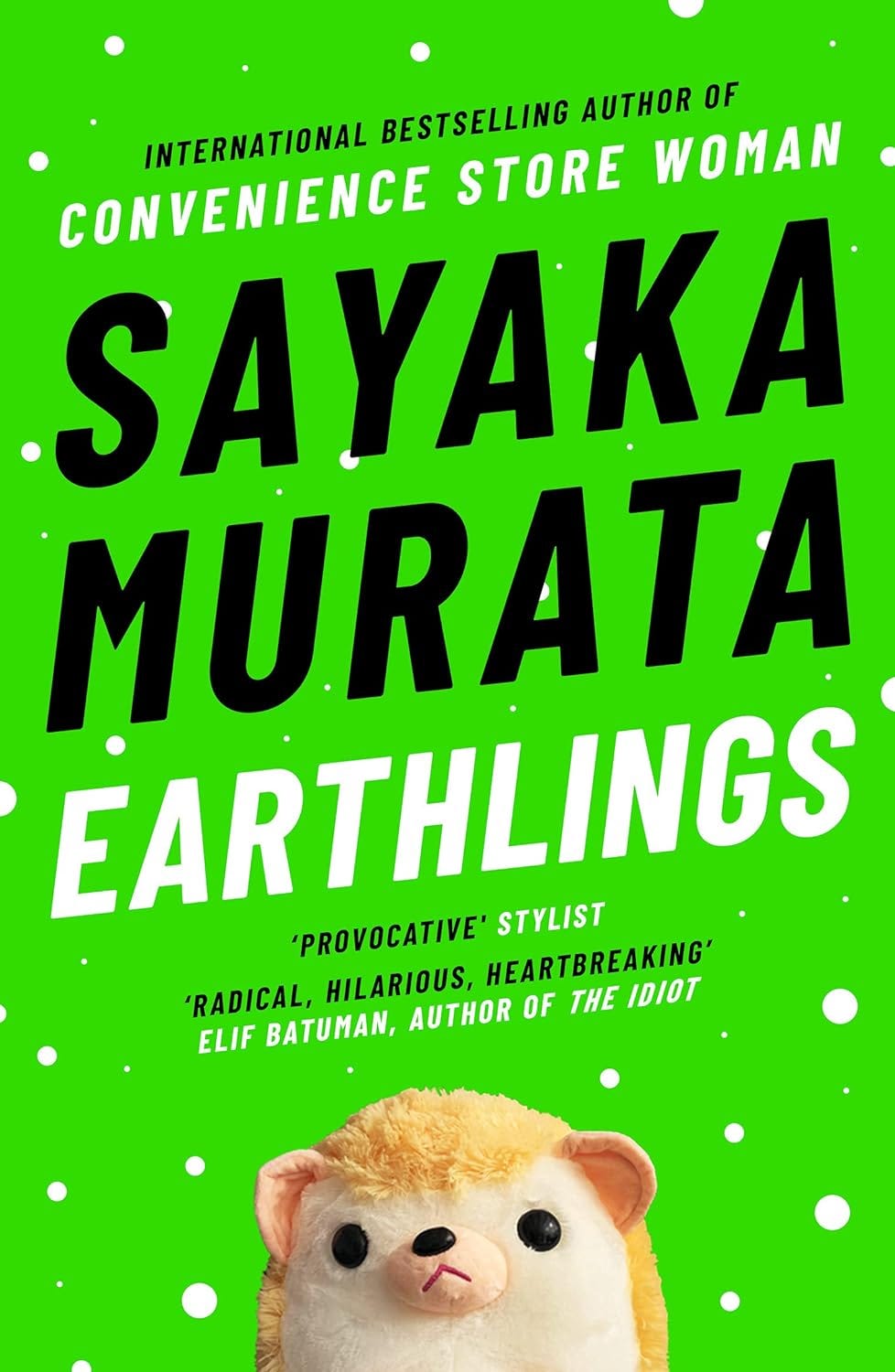Hello everyone. Welcome back to New Escapologist, the monthly newsletter from the non-existent offices of the magazine of the same name.
I’ve been trying to get distribution for the magazine. That is, I’ve been looking for a third party willing and able to get it into shops.
I’d long ago given up on this sort of thing, happy instead to operate online and to ship every copy myself. But I’ve been re-thinking this. Our eccentric message would reach more people if it were available in some shops. Plus, copies sold offline would support the culture of bookshops as well as just the magazine.
Naturally, you will never see New Escapologist on the shelves of supermarkets or other morally dubious big box outlets, but wouldn’t it be pleasant to walk or cycle to your local arts centre or independent bookshop, knowing that New Escapologist is on the shelf? What a treat that would be.
This might all be wishful thinking. I’ll let you know next month if you can expect to wake up to such a beautiful world in December. We’re a niche thing really: distributors are likely to scratch their heads and say “who on Earth is this for?”
Thank you for continuing to read the magazine (a few copies of Issue 14 remain available and Issue 15 can be pre-ordered too) as well as this easy-going newsletter.
Your friendly neighbourhood escape artist,
Robert Wringham
www.newescapologist.co.uk
Good News if True
Well now. The Guardian reports that young people are ditching “overtime and excess work stress” in favour of “family and fun.” Good news if true.
When Molly, 35, was growing up, she remembers the message of “work hard and you’ll get rewarded” being drilled into her by parents and schoolteachers. As a result, she spent her early career putting in the hours. But when she had a child and sought a flexible work pattern at her professional services job, the company denied her request. “I was replaceable,” she says. “I was very much a cog in the machine.”
I always enjoy hearing about the epiphany. I collect epiphanies: the memorable moment, perhaps with one foot in the commuter carriage and the other still on the platform, when a person snaps and says “no more.”
This said, I’m always amazed that it so often takes an existential shock like having a child or getting ill to realise that “work hard and you’ll get rewarded” is rubbish.
The most “rewarded” in our society have not worked hard for it: they’ve usually inherited their wealth or were born into the sort of privilege that means playing the game on easy mode, or else they’ve done something tricksy and/or immoral. There are exceptions, of course, and the media is all too happy to spotlight them to prop up the myth of meritocracy.
Meanwhile, the sort of people who work hard are hospital porters, cleaners, and the hardhats who maintain railway lines at night. They “bust a gut” as my ex-coal miner dad would put it and they aren’t rewarded beyond the essential basics that will keep them coming back to work. Some of them even die at work.
These twin observations—that the rewarded do not work hard and that the hard-working are not rewarded—are as plain as day. You shouldn’t need a baby or a tumour to shock you into sense.
Then again, the “work hard and you’ll get rewarded” message appears on all sides, doesn’t it? From relatives and teachers and colleagues and bosses and the television. It’s insidious and it’s everywhere. It’s called the Protestant Work Ethic and it’s a scam.
Molly is one of many in her generation readjusting their work-life balance to focus less on their job. Research published this month from King’s College London based on surveys from 24 countries found that just 14% of UK millennials (people born from the early 80s to mid 90s) believe work should always come first, compared with 41% in 2009.
So maybe it is true. Good news indeed.
Perruque
Here’s a fun word I haven’t come across before: perruque. It means to pilfer time or surplus resources from work.
It’s not in Glenn’s Glossaries, which is probably forgivable since I found it in an essay called “18 Semiconnected Thoughts on Michel de Certeau, On Kawara, Fly Fishing, and Various Other Things,” which some might say is a bit obscure.
It comes up when the essayist, Tom McCarthy, speaks of The Practice of Everyday Life, Michel de Certeau’s 1974 book about the ways people tend to adapt what the built environment gives them. (To give you a better idea of what this means, the cover usually shows an image of desire lines).
McCarthy writes:
Perruque is when the little guy, the worker, does something for his own ends under the guise of obediently serving his employer. When a cabinet maker uses a lathe to make a piece of furniture for his living room, that’s perruque; so is when a market researcher or ad agency employee abandons himself to reverie for half an hour. Whacking off on the boss’s time.
I mention this excitedly to my wife who tells me that perruque is French for “wig.” What’s the connection?” I ask. “Subterfuge,” she says.
Ever brilliant, my wife actually owns a copy of The Practice of Everyday Life so we pluck it from the shelf and find she earmarked the page about perruque years ago.
The example of the cabinet maker and his lathe is right here in de Certeau (a bit lazy, McCarthy). He also provides the lovelier example of “a secretary’s writing a love letter on company time.”
He continues:
Accused of stealing or turning material to his own ends and using the machines for his own profit, the worker who indulges in la perruque actually diverts time (not goods, since he uses only scraps) from the factory for work that is free, creative, and precisely not directed toward profit. In the very place where the machine he must serve reigns supreme, he cunningly takes pleasure in finding a way to create gratuitous products […] and to confirm his solidarity with other workers or his family through spending his time in this way. With the complicity of other workers (who thus defeat the competition the factory tries to instil among them), he succeeds in “putting one over” on the established order on its home ground.
So it’s a very fine example of sticking it to The Man. It’s also an example of what I once described as “escaping the Holodeck using holographic tools.” You mustn’t feel bad about an act of perruque. You owe your escape to the greater good and it’s no fault of yours if the captor has left some handy holographic shovels and power drills lying around.
New Escapologist was originally a perruque project of sorts: blog entries pecked out on company time and a pilot issue printed on A4 paper stolen from temp jobs (as apparently was Processed World, another magazine about office confinement).
Hugo
My tastes are aristocratic, my actions democratic.
Thus spake Victor Hugo, author of Les Misérables and The Hunchback of Notre Dame.
He reminds us to enjoy rarefied art and culture without being an asshole about it.
Dreamer Hugo:
Reprioritisation
A further observation from that Guardian report on the young people who ditch hard work:
James, a 31-year-old in Glasgow, had always worked hard, from striving for a first at university to working until 8pm or 9pm at the office in the civil service in the hopes of getting noticed. But during lockdown in 2020, James had an epiphany about what he valued in life when reading the book Bullshit Jobs by the anthropologist David Graeber. “He talks a lot about how jobs that provide social utility are generally pay-poor while the inverse are paid more,” James says.
Hooray! Graeber’s legacy lives on. His message was heard.
Meanwhile, New Escapologist (and the Idler and others) will continue to chip away at grind culture and the Protestant Work Ethic from the sidelines.
[James] now focuses on his life, putting his phone on aeroplane mode while doing activities such as hiking, reading and watching films. “I still value work, I’m very committed to my position. But I’ve just realised that this myth a lot of millennials were told – graft, graft, graft and you’ll always get what you want – isn’t necessarily true,” James says. “It’s a reprioritisation.”
Novel(s)
It’s about time I told you—the readers of New Escapologist—about my novel(s).
My first novel was published earlier this year. It’s called Rub-A-Dub-Dub. I’ve been promoting it here and there but I’m not sure I’ve mentioned it properly to you yet.
It wasn’t supposed to be “an Escapological novel” but it sort-of is. It’s certainly about the indignities of wage labour.
Our hero cleans seat-back trays and collects rubbish and unblocks toilets on long-distance trains from Edinburgh to London. He doesn’t live in either city though, so he must also commute to work by rail and, as such, spends a sizable part of his life on trains. He’s not sure sometimes if he’s working or commuting (perhaps a feeling familiar to many since even the longest commute is not typically remunerated: vast swathes of precious life being squandered in lurching transit is just the cost of doing business).
A colleague eventually tells our man that the problems of his life might stem from his odour problem! He’s smelly, in large part because of his exertions. And so he embarks on a voyage of self-improvement, which starts with luxurious soaks in the tub. It’s not just about being smelly or unsmelly: it’s about taking care of yourself more generally, slowing down, taking the time to think.
Our man is the victim of a century of decision-making for which he wasn’t present. Choices made in the Industrial Revolution dictate how he spends his days. He doesn’t want to believe in Fatalism but the more he mulls over his problems, the better he comes to see that his place in history is as much to blame for his predicament as anything he’s done wrong himself.
This is the Escapological crux of it all. I didn’t know I was writing Escapology but I was. Or at least I was writing about the problem for which Escapology is but one solution.
It seems that the indignity and unfairness of work is one of my obsessions and I wonder now if it will make an appearance in any future novels I write too.
Rub-A-Dub-Dub is available in paperback and digital formats from P&H Books.
Living on the Ideas We Come Up With
Earthlings by Sayaka Murata is a fun short novel about being an outsider.
The characters believe themselves to be aliens since the demands of society—tolerated or enjoyed by seemingly everyone else—feel too great. The main character, Natsuki, is afraid of sex and reproduction. Her husband hates going to work.
Before we go any further I should explain that these characters are hardly role models for Escapologists: they’re darkly messed up and the way things end for them is… insane.
Crazy it all may be, but these moments of alienation are probably relatable:
Everyone believed in the Factory. Everyone was brainwashed by the Factory and did as they were told. They all used their reproductive organs for the Factory and did their jobs for the sake of the Factory
“The Factory” is what they call society. They see themselves as “tools” of the Factory, that they’re expected to work and breed in its service.
Our aliens escape in a limited way and we get the kind of momentous sentence I always love:
From the next day, our way of life changed completely.
And then they discuss their new life on the lam, which feels decidedly Escapological:
“But what are we going to do from now on? We might very much be Popinpobopians now, but to stay alive we need to rely on Earthling knowledge. And if we keep doing that we might become Earthlings, mightn’t we?”
“We’ll have to think about it. Staying alive is about coming up with ideas. Living on the ideas that we come up with.” My husband frowned and sniffed.
“Ideas? Really?”
“Yes. Not imitating the Earthlings but coming up with our own ideas for living. That’s how we can live on a planet that isn’t our own.”
Man, what a book. Such good fun. But perhaps not for the queasy.
Trapped on a Wheel
I’m editing a book (this one) in which author John Robinson puts his finger on what I hate about television:
There’s a clichéd storyline you often see in television adverts: a man gets insurance for his car, you see him and his girlfriend buying a home, you see her pregnant, then with a child, then the child grows older and requires its own car and insurance. It’s a circle-of-life story often used to indicate the permanent necessity of brand loyalty, of commerce and capitalism: a depressing indication that we are trapped on a wheel, ground into society. It’s a literal statement that our purpose is purely to consume and procreate. Of course, these adverts show only heterosexual couples, because they are the grist to that mill. The fact that gay couples can adopt does not fit the template the advertiser desires: there remains an ingrained bias towards heteronormativity.
Yes! I know exactly the sort of advert John means. I can’t name the company behind the advert or even if there is any one advert that tells precisely this story, but it nails the tone of a certain patronising wave of shithouse commercials on mainstream telly.
And it’s not just in the adverts: it’s baked into the media, this up-propping of the passive suburban non-culture that facilitates the mass milking of human beings for fun and profit.
In moments of human weakness, I occasionally stream an ITV gameshow called The Chase. It’s a good quiz because the questions comes thick and fast so it’s easy to play along at home, stroking the chin and shouting out the answers.
But the unthinking drivel the host comes out with! And the one-dimensional propagandic pap you’re subjected to in the ad breaks. The ads don’t just tell you what to buy: they tell you how to be. Men are like this, women are like that, and on and on.
It’s a window into how the powerful want us to behave: don’t think, it’s cute to be a dafty, love the Royal Family, buy stuff, eat cake, respect the government, don’t criticise, car go vroom-vroom, remember to replace yourself with another consumer on the way out. It almost makes me hate humanity. Which is why it’s best not to watch it.
Protect your brain! Throw away your TV, for it is a portal of toxic slurry!
Unstick yourself from that wheel. Be like Victor Hugo instead.
Letter to the Editor: The Motion of the Yellowish Light
To send a letter to the editor, simply write in. You’ll get a reply and we’ll anonymise any blogged version.
Reader G writes:
Dear Robert,
I was thinking about your fondness for what you call “epiphanies,” that moment you said when one foot is on the train and the other foot is on the platform. I remember mine and you’re welcome to it. I was photocopying something in the office and for some reason it had to be done with the lid open. The light that goes back and forth was gradually blinding me in a very particular way. I could still see the motion of the yellowish light when I closed my eyes. The whole thing lulled me into a hypnotic state, at which point I knew something was wrong. I forced myself to snap out of it, not just for the sake of this moment but forever. I carried my notice around in my pocket for a few weeks and finally signed it, dated it, and handed it to my boss’s PA. I was free.
That’s all for another fine edition. Remember to buy one of our last copies of Issue 14 and to pre-order Issue 15 if you have not already. Let’s keep the spirit of escape alive!
Until November…
Robert Wringham
New Escapologist









